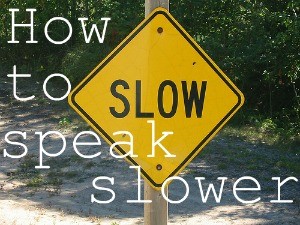If you talk on the phone a lot as part of your work, especially if you read from a script, you may have had people tell you you’re speaking too fast. There are many reasons why people may speak to fast, such as being nervous or not being familiar with the script they’re reading, or just not being familiar with the product they’re selling. There are some things you can do to work on slowing down your speaking rate, however – I’ll provide some tips in this blog post.
One thing that I’ve been trying to do to talk slower is to pronounce each word in my scripts clearly, even words like “the” and “for.” I also try to make sure I pronounce difficult words like medication names and names of illnesses and diseases clearly. I’ve also been trying not to run words together, but this one has been difficult for me. When I read a list of medications or illnesses (as I quite often have to do when reading scripts for my job) I’ve been trying to pause for a second after each one. I’ve also been trying to review some of the scripts I read less often, because part of my problem with speaking too fast is that I tend to want to rush through scripts that I’m not familiar with.
One article that I read provided some tips that were especially helpful. These tips included:
- Listen to the paces that people talk at – If you listen to talk radio, notice the people who speak slower. In conversations, when do people slow down? If you don’t listen to talk radio, you might want to start by listening to TED talks – these can be found here.
- Explore the difference in energy level and pace – One of the misconceptions about speaking slower is that it will make you sound boring – actually a slower pace can make you sound more interesting, but if your voice has low energy, that will make you sound boring.
- How to know if you’re speaking slowly enough – think of speaking slower as speaking clearer – enunciate each word clearer, and with more space around it. You’ll also know if you’re speaking slowly enough if you can hear each word you’re saying.
- Record yourself – this step is optional – if you absolutely hate hearing the sound of your voice, skip it. But if you’re really committed to slowing your speaking rate, try doing the following exercise: Get a voice recorder and start recording yourself talking about something that happened to you recently. Start by talking at your normal speaking rate, then after a few minutes slow down a little. After another minute, slow down even more. After you’ve recorded yourself for a few minutes, listen to yourself. Concentrate only on your pace and the effect of it. – I actually have been doing this, but what I’ve been doing is reading the scripts as clearly as I can, then listening to my recording of myself and going through the scripts and making notes about things I need to enunciate better or remember to say.
- Calibrate your speaking rate to the familiarity of the group you’re speaking to – If you’re speaking to people who know you, such as close family or friends, speak at your normal pace. If you’re speaking to close co-workers, speak a little slower. If you’re speaking to people outside your circle who you know even less, speak even slower. and if you’re speaking to people outside your department, your company or even your country (in other words complete strangers) slow down even more.
At the suggestion of one of my supervisors, one tip that I’ve started using when working on speaking slower is to practice troublesome words or phrases in front of a mirror – this allows me to see what my lips look like when I say these words or phrases. This actually has helped me start slowing down a little.
If you’re a fast talker like me, I hope you’ve found these tips helpful. If you have any other tips that have worked for you, I’d love to hear them!

Leave a Reply